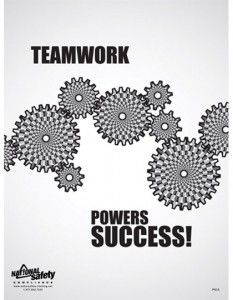Not long ago, we talked about mistakes – how we handle our own, and those of our coworkers. One of the main causes of errors, incidents and injuries at the workplace may be a lack of communication. Have you ever felt that you worked in a “top secret organization”, where only the chosen few knew anything about what was going on? If you often hear, “I didn’t know,” as an excuse, chances are that person probably didn’t know. Many times, a boss or supervisor will tell their assistant, but it never trickles down to the people who need to know what’s going on.
In the military, communication is of the utmost importance. Even then, there may have been errors made that proved costly. Whatever field you choose to work in, it is important that you do your part by paying attention. Have you ever noticed when you tell someone something, by the time it has circled the group of friends or coworkers, it’s not even close to the point you were trying to make? You can tell ten different persons the same thing and they all may walk away with a different point of view.
When your company has an effective communication strategy, the whole team excels. Employees will come closer to working together with the same goal in mind when they are fully informed on what is expected to happen and how it will be achieved by teamwork, and sharing of information. Most times, it isn’t necessary to speak eloquently, just put it in pure layman’s terms. Don’t be afraid to hurt someone’s feelings. You’d rather do that, than have someone injured because they didn’t get the message. Employee performance will be enhanced if they are given instructions that produce the correct results.
Another way to improve communication is to ask for others’ opinions. After all, the workers are the ones that see mistakes and know how to improve productivity. Many times, they won’t say anything because they are afraid they will upset their supervisor. So ask for their input, and take heed. Teamwork is the key to success in any business. Lack of communication can lead to mistakes, confusion, anger, misunderstandings, and anger or resentment. There’s no room for any of that in business. As this motivational safety poster says:

There are many consequences of poor communication, such as:
- Fear. If workers are afraid there are going to be lay-offs, rumors may start circulating, without communication from the authorities to put their fears at rest.
- Stress. If there is tension in the workplace, problems grow. Persons who are stressed tend to make mistakes.
- Gossip. Rumors spread, which can lead to false information.
- Mistakes. Misunderstanding and confusion can lead to costly errors.
- Less Productivity. Taking unnecessary steps because of lack of communication, or often redoing their own work or someone else’s.
- Lack of Confidence. Employees misinterpret information, and may begin to feel unappreciated if the information wasn’t fully given to them. Everyone likes to feel appreciated.
- Low Morale. Employees either carry on, giving only the minimum expected of them, or they quit.
No doubt we have all dealt with establishments that have poor communication. It leads to customer dissatisfaction , resulting in loss of customers. It may not be the fault of the employees who work there, but a serious lack of clear communication and contact between the leadership and employees. More often we are seeing that employees are there for one thing, and that is to get the paycheck. Effective communication increases morale among workers, letting them know that they are important to the company. Things need to change back to when keeping the customer satisfied was the #1 priority. When customers are pleased, it is a reflection of happy workers.